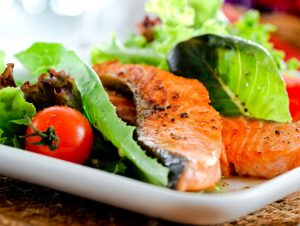How to Eat Well When You Have Arthritis

While there is no specific “diet” that people with arthritis should follow, researchers have identified certain foods that can help control inflammation. By eating certain anti-inflammatory foods—and limiting others—you may help ease the pain, stiffness, and other symptoms of arthritis.
Eating well can help you manage—or maintain—your weight. Not everyone with arthritis will need to lose weight, but if you are overweight, getting to a healthier weight by eating well can be helpful in managing your arthritis.
Foods to Eat to Help Ease Arthritis
Fruits and vegetables: These superfoods contain vitamins, minerals, and phytochemicals (natural chemicals found in some plant foods) to help you combat joint pain and swelling. The more colorful the better. Red grapes, blueberries, carrots, and spinach are some examples of fruits and veggies that may have anti-inflammatory benefits.
Omega-3 fatty acids: Fish, such as salmon, and other foods with omega-3 fatty acids (essential fatty acids that can help reduce inflammation and pain) can help ease sore, achy joints. If you’re not a fan of fish, you can eat walnuts, flaxseed, and olive oil, or take an omega-3 supplement to get the same benefits.
Vitamin D: Foods with vitamin D, such as eggs, mushrooms, and fortified foods (eg, fortified orange juice and breakfast cereals), can help you manage arthritis pain.
Spices: Ginger, turmeric, dried chili peppers, and cinnamon can help ease arthritis symptoms: They may have anti-inflammatory effects on the body, helping to reduce swelling and stiffness. An added bonus is that these spices are brimming with flavor without adding any calories.
Foods to Limit with Arthritis
Aspartame: This man-made sweetener contains certain chemicals that can increase pain perception. They do this by triggering neurons in your brain. Aspartame can be found in all types of foods—from soft drinks to ice cream to seemingly healthier foods like yogurt.
Processed foods: Eating enough foods that contain monosodium glutamate (MSG) or nitrates may eventually lead to inflammation. MSG is found in some frozen dinners, and nitrates can be found in hot dogs.
Trans fats and saturated fats: Think packaged baked goods and fast food French fries: These foods can promote inflammation—not to mention clog your arteries.
